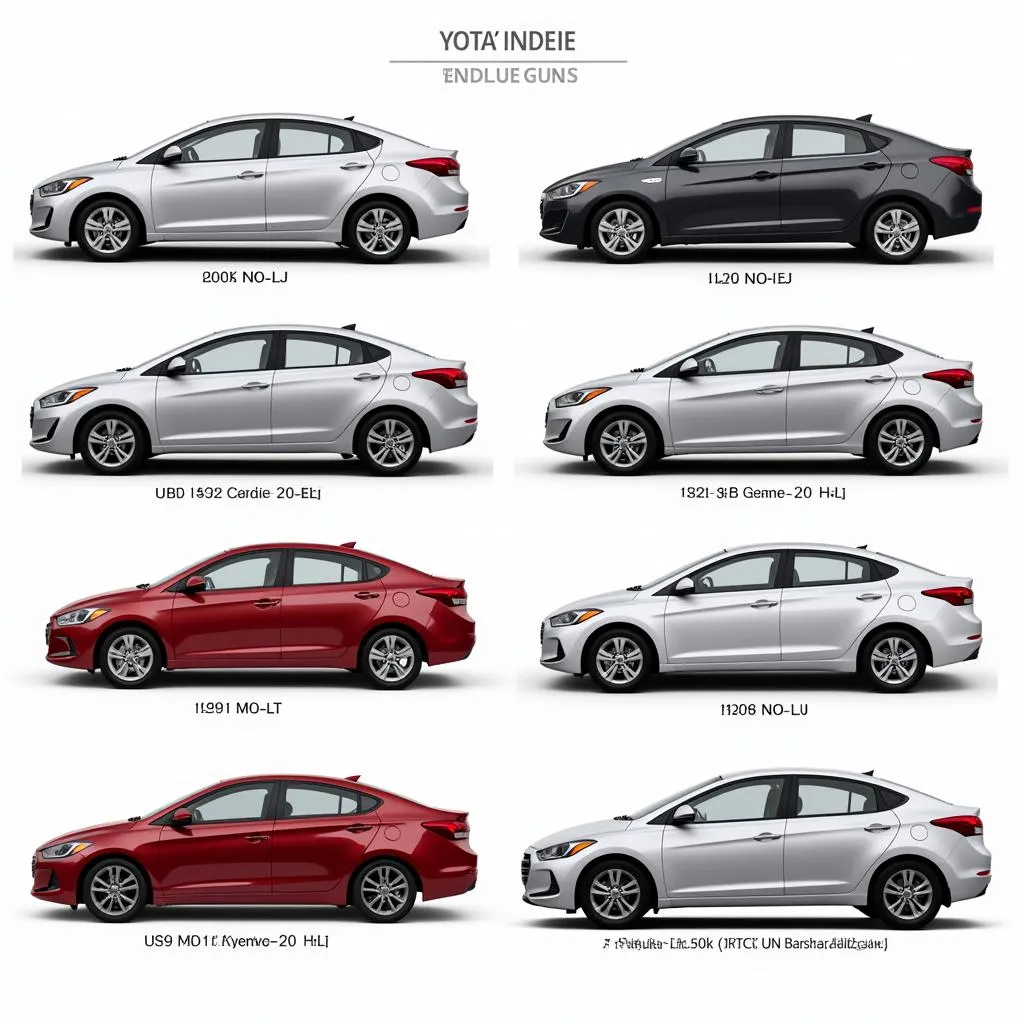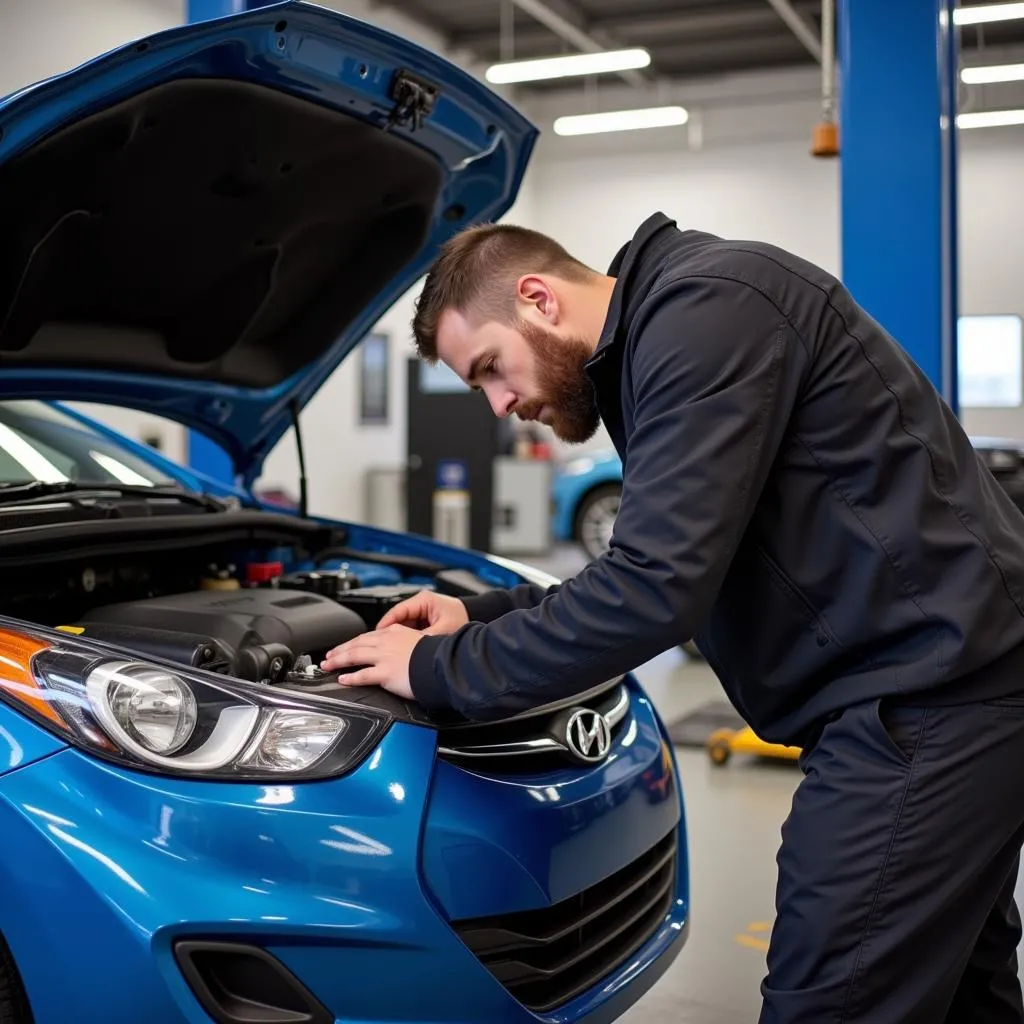Looking to navigate the world of pre-owned vehicles and set your sights on a “second hand car Hyundai Elantra”? You’ve come to the right place. The Hyundai Elantra has built a solid reputation for reliability, affordability, and fuel efficiency, making it a popular choice in the used car market. However, buying any used car, even a well-regarded one like the Elantra, requires careful consideration and a thorough inspection. This guide will equip you with the essential knowledge to make an informed decision when buying a second-hand Hyundai Elantra.
Why Choose a Used Hyundai Elantra?
The Hyundai Elantra consistently receives praise for its value proposition, especially in the used car market. Here’s a closer look at the compelling reasons why a pre-owned Elantra might be the perfect fit for you:
- Affordability: Compared to its rivals in the sedan segment, the Hyundai Elantra often boasts a more attractive price tag in the used car market. This allows you to access a well-rounded vehicle without breaking the bank.
- Reliability: Hyundai has made significant strides in vehicle reliability, and the Elantra is no exception. You can generally expect a used Elantra to provide dependable performance with proper maintenance.
- Fuel Efficiency: In an era of fluctuating fuel prices, the Elantra’s impressive fuel economy makes it an economical choice for daily commutes and longer journeys.
- Features: Even in its earlier iterations, the Hyundai Elantra often comes equipped with a surprising number of features for its price point. You might find features like Bluetooth connectivity, heated seats, or a rearview camera in models that are several years old.
 Used Hyundai Elantra Models
Used Hyundai Elantra Models
Essential Checks Before Buying a Used Hyundai Elantra
While the Hyundai Elantra is generally regarded as a reliable car, a thorough inspection is crucial before purchasing a used model. This helps you identify any potential issues and ensures you’re making a sound investment.
1. Vehicle History Report
Obtain a comprehensive vehicle history report from reputable sources like Carfax or AutoCheck. This report unveils the car’s past, including accident history, title issues (salvage, flood damage), and service records. A clean history report is a strong indicator of a well-maintained vehicle.
2. Mechanical Inspection
A professional mechanic specializing in Hyundai vehicles should conduct a pre-purchase inspection. They can thoroughly examine the engine, transmission, brakes, suspension, and other crucial components for any signs of wear, damage, or potential problems.
3. Test Drive
Never skip the test drive! It allows you to experience the car firsthand and assess its driving dynamics. Pay close attention to:
- Engine Performance: Listen for any unusual noises, vibrations, or hesitation during acceleration.
- Transmission: Ensure smooth shifting without any slipping, grinding, or jerking.
- Brakes: Check for responsiveness, unusual noises, or pulling to one side.
- Suspension: Be alert for any excessive bouncing or swaying, indicating suspension issues.
- Steering: Make sure the steering feels tight and responsive, with no unusual play or vibrations.
- Electrical Systems: Test all lights, signals, windows, locks, and the infotainment system to confirm proper operation.
 Mechanic Inspecting a Used Hyundai Elantra
Mechanic Inspecting a Used Hyundai Elantra
Common Issues to Watch For in a Used Hyundai Elantra
While the Elantra has a reputation for reliability, some common issues have been reported in certain model years. Being aware of these potential problems can help you make a more informed decision:
- Engine Problems (Theta II Engines): Some Elantra models equipped with the Theta II engine (typically 2011-2014) have experienced engine problems, including excessive oil consumption and engine failure. It’s essential to verify if the specific model year you’re considering is affected by any recalls or service campaigns related to this issue.
- Transmission Issues (Dual-Clutch Transmission): Certain Elantra models equipped with the dual-clutch transmission (DCT) have reported issues like rough shifting, hesitation, and clutch problems. If you’re considering a DCT-equipped Elantra, research its reliability and factor in potential repair costs.
- Suspension Concerns: Some owners have reported premature wear in suspension components like struts and shocks, especially in older Elantra models.
- Interior Trim: The interior quality of older Elantra models might not be as refined as newer iterations. Inspect the cabin for any excessive wear, rattling noises, or loose trim pieces.
Tips for Negotiating a Fair Price
Once you’ve found a used Hyundai Elantra that meets your criteria, it’s time to negotiate a fair purchase price. Keep these strategies in mind:
- Research Market Value: Use online resources like Kelley Blue Book or Edmunds to determine the fair market value of the specific Elantra model year, mileage, condition, and location. This knowledge empowers you to negotiate from a position of strength.
- Factor in Inspection Results: If the mechanic’s inspection reveals any necessary repairs, use those findings as leverage to negotiate a lower price or request the seller to address the issues before the sale.
- Be Prepared to Walk Away: It’s essential to be willing to walk away from a deal if the seller is unwilling to negotiate a fair price or if you have any lingering doubts about the car’s condition.
 Negotiating the Price of a Used Hyundai Elantra
Negotiating the Price of a Used Hyundai Elantra
Conclusion
A second-hand Hyundai Elantra can be a compelling choice for budget-conscious car buyers seeking a reliable and fuel-efficient vehicle. However, a thorough inspection, vehicle history check, and careful negotiation are essential steps to ensure a successful purchase. By following the guidance in this article, you can confidently navigate the used car market and find a pre-owned Hyundai Elantra that meets your needs and budget.
FAQs About Buying a Used Hyundai Elantra
1. What is the average lifespan of a Hyundai Elantra?
With proper maintenance, a Hyundai Elantra can last well over 200,000 miles. Regular servicing and addressing any issues promptly can significantly extend the lifespan of your Elantra.
2. Are used Hyundai Elantras expensive to maintain?
Hyundai vehicles are generally known for their reasonable maintenance costs. Routine servicing and common repairs tend to be affordable compared to some other car brands.
3. Where can I find reputable used Hyundai Elantra dealers or sellers?
Reputable used car dealerships, certified pre-owned (CPO) programs from Hyundai dealerships, and online marketplaces with buyer protections are good places to start your search.
4. What are the different trim levels available for used Hyundai Elantras?
Trim levels and available features vary by model year. Common trim levels often include base models (GLS, SE), mid-range options (SEL, Value Edition), and higher-end trims (Limited, Sport).
5. Is it worth buying an extended warranty for a used Hyundai Elantra?
The decision to purchase an extended warranty depends on your risk tolerance and the age/mileage of the used Elantra. If you’re concerned about potential repair costs, an extended warranty can provide peace of mind.
Looking for other car options? Check out our article on the best used car to buy.
Need Help Diagnosing Car Issues?
DiagXcar is here to support you with advanced dealer-level diagnostic tools. Contact us today for all your car diagnostics needs.
WhatsApp: +1(641)206-8880
Email: [email protected]
Address: 276 Reock St, City of Orange, NJ 07050, United States
We have a 24/7 customer support team ready to assist you.


